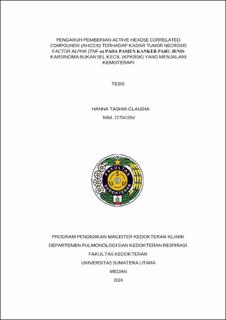Pengaruh Pemberian Active Hexose Correlated Compound® (AHCC®) terhadap Kadar Tumor Necrosis Factor Alpha (TNF-α) pada Pasien Kanker Paru Jenis Karsinoma Bukan Sel Kecil (KPKBSK) yang Menjalani Kemoterapi
The Effect of Active Hexose Correlated Compound ® (AHCC ®) on Tumor Necrosis Factor Alpha (TNF- Α) Levels in Patients with Non Small Cell Lung Carcinoma (NSCLC) Undergoing Chemotherapy

Date
2024Author
Claudia, Hanna Tashia
Advisor(s)
Soeroso, Noni Novisari
Tarigan, Setia Putra
Metadata
Show full item recordAbstract
Background: Lung carcinoma is the most common cancer in the world today, accounting for 12.6% of all new cancer cases and 17.8% of cancer deaths. Malnutrition and sarcopenia are common conditions that often occur in patients with lung cancer. This occurs due to the inflammatory state that drives anorexia which ultimately leads to weight loss. Active Hexose Correlated Compound® (AHCC®) is a nutritional supplement made from shiitake mushroom mycelia and consists of a mixture of polysaccharides, amino acids, and minerals. AHCC® has been studied to improve the prognosis and quality of life of patients with liver, lung, head, and neck cancers.
Objective: To determine the effect of AHCC® administration on TNF-α levels in NSCLC patients undergoing chemotherapy.
Method: This study is a quasi-experimental study with a prospective double-blind approach in which three blood draws were carried out after the first and fourth cycles of chemotherapy after AHCC was given to the case group and placebo to the control group. A total of 25 patients diagnosed with NSCLC were given AHCC® and 25 patients were given placebo.
Results: Most patients were male (94%) with age older than 60 years (50%). The majority of patients were active smokers (60%) and heavy smokers (86%). Most patients had an underweight body mass index (52%). There was a significant difference in TNF-α levels before and after AHCC® was given in each chemotherapy cycle (P-value 0.016) compared to placebo (P-value 0.002).
Conclusion: Supplementation of AHCC® had a positive effect on lowering TNF-α levels in NSCLC patients, with the difference in the reduction of TNF-α levels before and after administration being higher in the AHCC® group compared to the placebo group with a value of 49.07.
